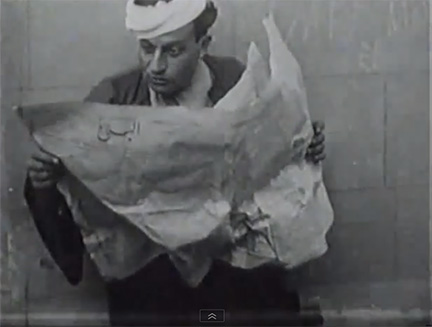
The first Egyptian silent film apparently appeared in 1923 under the title Barsoum Looking for a Job
برسوم يبØØ« عن وظيÙØ©
It is now on Youtube. It has poor, hungry Egyptians, lots of fighting, a dinner party and a drunken ending…

The first Egyptian silent film apparently appeared in 1923 under the title Barsoum Looking for a Job
برسوم يبØØ« عن وظيÙØ©
It is now on Youtube. It has poor, hungry Egyptians, lots of fighting, a dinner party and a drunken ending…

Graphic images of Shaimaa al-Sabbagh, an Egyptian activist who was shot and killed at a peaceful rally in Cairo on Saturday, sowed outrage on social networks;
Al Youm Al Saabi /Reuters
There is a phrase that sometimes says it all: “All hell has broken loose.” For anyone who knows the history of humanity, this is a sentiment that could be offered in any age. There is still “hell to pay” for some people on every corner of the globe. And it is not necessary to wait until “hell freezes over” to see or experience “hell on earth.” You can take your pick of hellish acts just in the last few days: a beheading here, an assassination there, a drone bomb here, a cluster bomb there, a suicide bomber here, a rape there, and the list goes on. The world’s attention was focused for the media minutes of a top story just a couple days ago when Yemen’s President Hadi and his entire government resigned, followed by the death of the aging Saudi monarch and leaving the Paris bombings in the dust (to be dusted off as needed ad infinitum by the Islamophobic surge sweeping Europe and shariahphobic America). Now there is the photo above: a woman protesting the abuse of an abusive dictatorial takeover in Cairo, a woman bringing flowers to the victims of a previous killing spree.
Look at this picture and you realize that talk of hell in the hereafter is not a comfort for those of us who find hell in the here and now. If an evil person will “get his” (I don’t know of that many women who create the kind of hell going on hourly and daily in the Middle East today) one day, it does not breathe life back into those whose lives have been taken away. Look at this picture and tell yourself this could be your mother, your sister, your wife or your best friend. Look at this picture and realize that this could be you. You may be far from this violence, this unleashed hellfire, this madness, this perversion of every positive value religions teach. You can look away, of course. You can see it as just another picture of which there are now millions, blood-soaked body parts unrecognizable. You can walk away, shaking your head, saying it can’t happen where you are. It may not, but it will continue whether you care or not. It is true that your tears will not raise the dead and protect the innocent. But shedding tears is the best way to respond to such terrible spilling of blood and still live with yourself as a human connected to other humans.
If I believed the hype of a literal hell and lake of fire, I would hope that those who commit acts of hell on earth would be greeted with automatic entry into the imagined hell of the hereafter. But those who do such despicable acts to fellow human beings are already chained to the hell they create for others. And the hell on earth is the only one that matters on earth. Hell is not in the hereafter; it is too powerful here and now to need a future.

Dear Husni,
I had no idea you were so poor. Only 25 million stashed outside Egypt? What happened to all the millions you took in over the years? Was your wife like Imelda Marcos, buying way too many shoes? Of course I will be glad to help you get access to that money. After all, you stole it fair and square. And Sisi can siphon off as much as he wants, now that the Brothers are gone. I know how much you have suffered, so I will not charge you anything for helping you. Some of my best friends are Egyptian and I know they would help me if I ever needed someone to get 25 million out of the bank. By the way, your English has really improved. Did you take lessons in prison? Or did you use Google Translate? You did not mention which bank your funds are in. Someone told me it was in the same offshore bank as the savings of Mitt Romney, but I find that hard to believe. I am really honored that you chose me out of the millions of people getting spam emails to help you. I am sorry it has taken so long but your email went into my Junk folder. Can you imagine that. I am really glad I found it. Just send me you bank name, account number and password and I will sure do you justice.
Yours sincerely,
John Doe
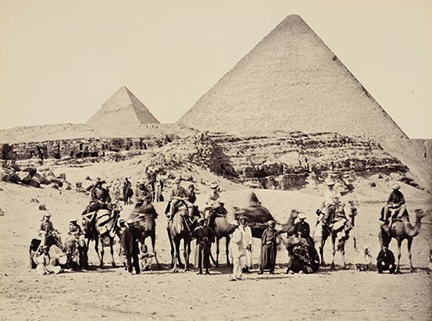
The Prince of Wales and group at the Pyramids, Giza, Cairo, March 1862 Royal Collection Trust / (c) Her Majesty Queen Elizabeth II 2014
Prints from first photographed royal tour go on show at Buckingham Palace. Click here to see ten images.
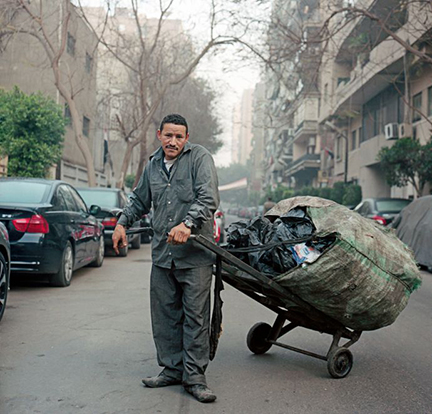
Waste collectors like Sayyid Ahmed, known as zabaleen, work in an informal economy, but they provide a remarkably efficient recycling service and become experts on their neighborhoods. Credit Photograph by Rena Effendi / Institute
The New Yorker has an excellent piece by Peter Hessler on Cairo as seen by the Zabaleen, the traditional garbage collectors.
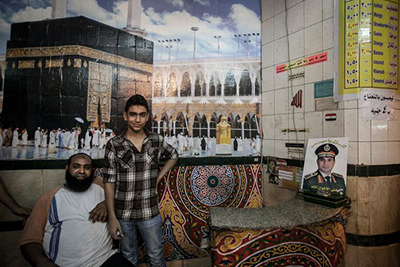
At a juice bar in Cairo, two men posed by a photograph of Gen. Abdul-Fattah el-Sisi. The general has become a popular figure among many Egyptians; Narciso Contreras for The New York Times
The future of Egyptian democracy: Islamism beyond the Muslim Brotherhood
by Yasmin Moll, The Immanent Flame, August 29
A few weeks after the ouster of Egyptian president Mohamed Morsi in 2013, the New York Times ran this headline: “Egyptian Liberals Embrace the Military, Brooking No Dissent.†The accompanying photograph showed a man with a full beard and shaved moustache in the Salafi style, a prominent prayer mark (a “raisin†in the Egyptian vernacular) on his forehead. Behind the man is a wallpaper of Muslim pilgrims circumambulating the Kaaba in Mecca. A framed portrait of then-general and coup master Abdel Fattah el-Sisi leans against beige tiles stickered with several Qur’anic verses. The headline limits the military’s support base to (secular) liberals, while the image shows us it actually extends beyond this narrow stratum.
With some exceptions, such as analyses published in this series, most scholarly accounts dovetail with media framings of Egypt’s fraught political scene since the 2011 revolution as primarily a struggle between secularism and Islamism. But the “secularism versus Islamism†narrativÂe is a political one—it performs important legitimizing labor for a plethora of social actors in Egypt, from the Brotherhood to deposed dictator Hosni Mubarak’s allies and both liberal and leftist activists alike. It is, however, of very limited analytical utility in making critical sense of what is actually at stake in the current impasse for the many Egyptians who do not subscribe to a secularized conception of government, yet whose religiosity cannot be conflated with the Islamism of the Muslim Brotherhood. Continue reading Islamism beyond the Muslim Brotherhood
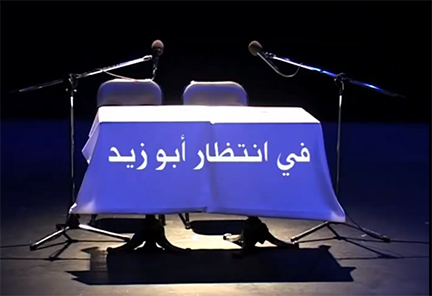
The Egyptian intellectual Nasr Hamid Abu Zayd, who passed away in 2010 at the age of 67, made a major contribution to the study of the Qur’an and other important aspects of Islam, for which he was branded an apostate in Egypt. For a summary of his life with links to videos and major works, check out the page on him in the series of “A Profile from the Archives” on al-Jadaliyya. For a film on his thinking, Youtube has the Lebanese film ÙÙŠ إنتظار أبو زيد .

By Sheila Carapico, Middle East Research and Information Project, July 1, 2014
* This memo was prepared as part of the “Ethics and Research in the Middle East†symposium
American political scientists studying the Middle East face ethical dilemmas not shared by most of our disciplinary colleagues. Sometimes – perhaps unexpectedly – our presence in countries or communities experiencing repression and/or political violence puts our local colleagues, hosts, or contacts at risk by association. The massive U.S. military footprint and widespread mistrust of U.S. policies and motives multiplies the risks to our interlocutors.
The trademark methodology of American Arabists is fieldwork, meaning, in political science, in-depth interviews, participant observation, data collection, document-gathering, opinion polling, political mapping, and recording events. As sojourners but not permanent residents, we rely heavily on the wisdom, networks, and goodwill of counterparts “on the ground,†particularly other intellectuals.
In any environment where agencies of national, neighboring, and U.S. governments are all known to be gathering intelligence, our research projects may look and sound like old-fashioned espionage. Even under the very best of circumstances (which are rather scarce) a lot of people are wary or suspicious of all Americans, including or sometimes especially Arabic speakers who ask a lot of questions and take notes. Immediate acquaintances probably grasp and trust our inquiries. Their neighbors or nearby security personnel may not. It is common knowledge that at least some spies and spooks come in academic disguise and that some U.S.-based scholars sell their expertise to the CIA or the Pentagon. Instead of treating whispered gossip as the product of mere paranoia or conspiracy theories, we need to recognize its objective and sociological underpinnings. Continue reading On The Moral Hazards of Field Research in Middle East Politics